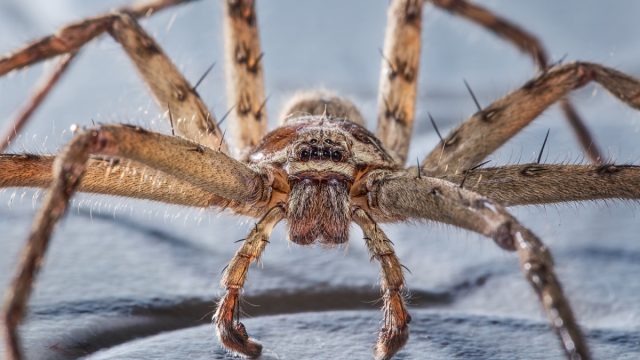If You Live in These States, Watch Out for the World’s Largest Spider

Spiders come in all shapes and sizes, and even the smallest of these creepy crawlers can give us quite a fright. According to Prevention, the most common spiders you might happen upon in the U.S. include the American house spider, wolf spider, and daddy longlegs. Fortunately, most of the typical arachnids you’re likely to discover in your home are not only small but also not harmful to humans. Depending on where you live in the country, however, you may still get scared to death by coming face to face with the world’s largest spider: the huntsman spider.
RELATED: If You’re Not Cleaning These 2 Spots, You’re Attracting Spiders to Your Home.
The huntsman spider is big and brown, with a leg span that can grow to 12 inches, making it the world’s largest spider by diameter, according to Live Science. In fact, this spider has often been described as being “the size of a dinner plate,” per the science news outlet.
Due to its color and size, this spider is sometimes mistaken for a brown recluse or a tarantula, but the telltale sign of a huntsman spider is the position of its lengthy legs. While most spiders’ legs bend vertically under the body, “huntsman spiders usually have legs that are splayed out to the sides, crablike,” Christy Bills, an entomologist and the entomology collections manager at the Natural History Museum of Utah, told Live Science.
According to Bills, “colors and patterns vary” for huntsman spiders, although their legs are usually gray or brown with bands. “They can often be quite large and very quick,” she adds, noting that this spider has the ability to move up to a yard in just a second.
The huntsman spider is also so big and scary that it does not need to “build webs to catch prey,” Bills said. Instead, it hunts its prey down, as its name suggests. And despite this spider not actually being venomous to humans, it will deliver a painful bite when it feels the need to defend itself, which can cause swelling, headache, and possibly nausea, per Orkin, an expert pest control company.
RELATED: For more on scary pests to avoid, sign up for our daily newsletter.
According to the Texas Invasive Species Institute, huntsman spiders have a sensitivity to cold that makes them prefer warmer climates, so this spider may be found hidden in houses, barns, or greenhouses when the weather gets colder. The flattened body of a huntsman spider also allows it to squeeze into “surprisingly small cracks and crevices,” according to Orkin, which makes it that much easier for it to sneak into your home.
This spider is native to Asia, but was likely transported to the U.S. through banana shipments from Central America, according to the institute. Read on to find out which states the huntsman spider has been found in, along with some notable sightings.
RELATED: If You Live in These States, Prepare for More of This Deadly Spider, Experts Say.
1
Alabama

In 2019, a Reddit user posted a photo of a spider on the ceiling of a home in Mobile, Alabama, which other users determined to be a huntsman spider.
2
California

A Reddit user posted photo of a Golden huntsman spider found climbing up a driver’s leg in Joshua Tree, California, in 2016.
3
Florida

MyBackyardBirding, a YouTube channel with more than 132,000 subscribers, posted a video of a large spider in Florida in 2015, with a Florida Department of Agriculture expert confirming it to be an invasive huntsman spider.
4
Georgia

The huntsman spider is common in Georgia, according to Drive Bye Exterminators, an exterminator company that removes this spider in Georgia and Florida.
5
Louisiana

A Reddit user in Louisiana posted a video of a huntsman spider leaping out of their mailbox in 2020.
6
Mississippi

Mississippi Bug Blues, an educational outreach program of the Mississippi Entomological Museum, posted a photo of a huntsman spider from the state in 2020.
7
Texas

In 2015, a Reddit user shared a photo of a huntsman spider his wife had found in their bathroom in Houston, Texas.
RELATED: If You See This Spider in Your Home, Don’t Step on It, Experts Warn.